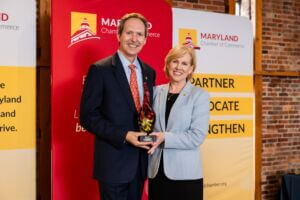News Release
Maryland Chamber Responds to Governor Moore’s Proposed FY2026 Budget
Jan 16, 2025
We stand ready to work with the administration and General Assembly to ensure a final proposal balances fiscal responsibility with sustainable economic growth
Annapolis, Md. — The Maryland Chamber of Commerce acknowledges Governor Wes Moore’s commitment to addressing Maryland’s fiscal challenges and pursuing initiatives aimed at fostering economic growth. We share his vision that growing Maryland’s economy, creating jobs and supporting businesses are essential to addressing fiscal challenges and securing long-term prosperity for all Marylanders.
However, we remain deeply concerned over several proposed tax policies, including individual income tax increases and the implementation of combined reporting. These proposals will disproportionately burden Maryland’s small business and hinder Maryland’s ability to attract and retain business investment.
While we support efforts to streamline regulations, improve permitting processes, and invest in critical industries like ports, manufacturing, cyber and artificial intelligence, these positive steps will be undermined by tax policies that discourage growth and investment. The proposed increase in personal income tax rates significantly impact Maryland’s small businesses, which make up 99.5% of businesses in the state. Many of these businesses are structured as pass-through entities and pay taxes at the individual rate. Higher taxes will reduce their ability to reinvest, expand and hire — ultimately stifling economic growth and job creation.
The implementation of combined reporting will deter business investment in Maryland. This tax policy, as proposed, would bring new complex compliance burdens and inaccurate tax assessments for Maryland businesses operating in multiple states. It will deter investment and reduce the ability for businesses such as retail establishments, restaurants and other small enterprises to reinvest, expand and hire within their community. It will also undoubtedly lead to volatile revenues, complicating financial planning for Maryland, at a time when we need it most.
“The Governor’s proposed budget includes important measures to create a stronger, more competitive Maryland,” said Mary D. Kane, President & CEO of the Maryland Chamber of Commerce. “We support efforts to reduce the corporate tax rate, eliminate barriers and support economic growth. However, we remain deeply concerned about policies included in the Governor’s proposed budget, like combined reporting and higher personal income tax rates, which could undermine the economic success all Marylanders seek — undercutting small businesses in the process. It is essential we work together to enact policies that make Maryland a top choice for businesses and families. By reducing barriers, fostering sustainable growth and supporting businesses, we can drive economic development and solve Maryland’s budget challenges for the long term."
As the budget moves through the legislative process, the Maryland Chamber stands ready to work with the administration and General Assembly to ensure the final proposal balances fiscal responsibility with sustainable economic growth. Together, we can enact policies that support businesses, create jobs and make Maryland the first choice for businesses and families alike.
For media inquiries or more information, please contact Vice President of Marketing & Communications Abbi Ludwig at aludwig@mdchamber.org or (302) 682-5772.
# # #
About the Maryland Chamber of Commerce
The Maryland Chamber of Commerce is the only statewide business advocacy organization and the leading voice for business in the state. Together with their 7,000+ members, they form a statewide coalition that is committed to ensuring that Maryland is attracting and retaining quality jobs, developing vibrant, sustainable communities and staying at the forefront of global competitiveness and economic prosperity.

Mary D. Kane
President & CEO
Maryland Chamber of Commerce


Why Businesses Like Yours Trust Us to Deliver Results